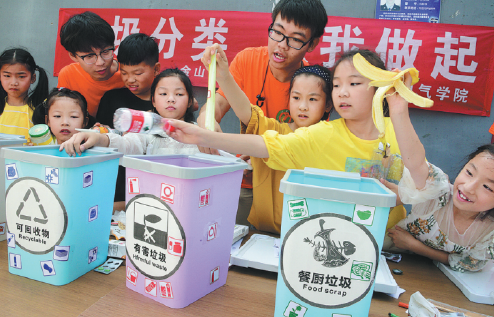Waste is bad taste as recycling steps up a gear
By Xu Lin | CHINA DAILY | Updated: 2020-03-04 07:25
 Two college student volunteers from Jiangsu University guide children in Zhenjiang in 2019 to learn to classify and dispose of waste correctly. SHI YUCHENG/FOR CHINA DAILY
Two college student volunteers from Jiangsu University guide children in Zhenjiang in 2019 to learn to classify and dispose of waste correctly. SHI YUCHENG/FOR CHINA DAILY
Peer support, family habits
Bie has made friends with many environmentally aware vendors and knows about how their goods are manufactured. She also collects plastic fillings used by delivery companies and gives them to these vendors for reuse.
Before shopping, she prepares different utensils-reusable lunchboxes for tofu, meat or cooked food, cloth bags for fruit and beans, and string bags for garlic and ginger.
"Some inspiration comes from the older generation," Bie says. "For example, before plastic bags were prevalent, they used to take bamboo baskets with them when they went to food markets."
Bie follows an essential rule-to refuse the purchase of new goods.
"And for an item that I don't need, I give it to friends or exchange it," she says. "Also, it's convenient to sell and buy items on secondhand online platforms, like books and electrical products."
Bie stuck to her ambitious plan of not buying new clothes throughout 2019. She exchanged secondhand clothes with her elder sister and friends who have also adopted a zero waste lifestyle.
"The method allows me to obtain clothes in a sustainable way," Bie says. "This way, I also have the chance to wear different styles of clothes that I've never tried before."
Bie knows it's important to have peer support in the zero waste community.
"If you want to try and adopt a new habit or some goods for the first time, you can always ask them for advice," she says.
For some people who adhere to a low carbon lifestyle, however, it can be a habit that's passed on from older generations.
Hu Yao, 34, a civil servant from Beijing, got used to separating dry and wet waste as a child.
She saves the waste water produced by the water purifier to wash vegetables first and then do housework. She economizes on electricity, and uses potato and carrot skins to cleanse the oil out of pans and bowls. She buys electrical appliances with low energy consumption.
She learned these life skills from her mother.
Hu says living costs in the capital are high, especially for housing and raising a child, so the family adopts these measures for economical reasons. Her mother also prefers refuse classification due to its cleanliness.
Her mother separates the sticky tape from packing boxes, throws it away and cuts the boxes into cardboard pieces to make learning cards for her grandson.
Hu's 4-year-old son has also learned about refuse classification at kindergarten via nursery rhymes.
"It's like a cultural inheritance within the family-I keep these habits due to education and the influence of my mother," Hu says.
"I believe my son will also carry on these habits, but for his generation, their impetus will be mainly about environmental protection."
Her son often wears old clothes from her friends' children. Her colleagues, according to Hu, like her, exchange secondhand clothes and toys with one another.
In Hu's eyes, old clothes may be even safer, since they were worn by other people thus "with less emission of formaldehyde", Hu says. "It also saves me much time, because, when I buy new clothes for my son, I will carefully read the labels to see if they are made of cotton or to what percentage for instance."
























